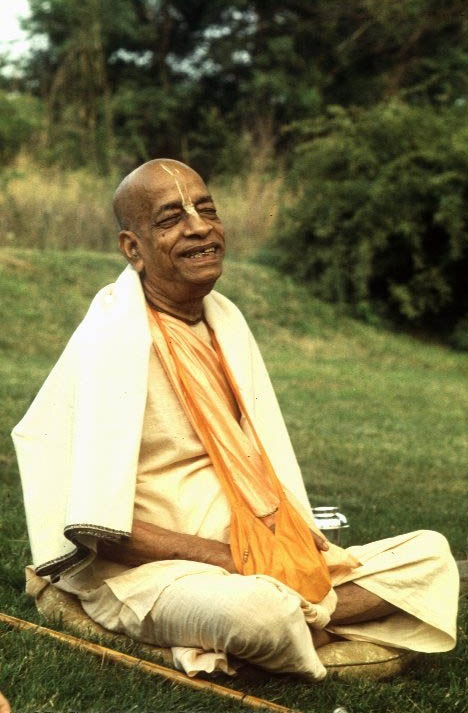"There are so many problems. The whole material world is full of problems. These problems are compared just like blazing fire in the forest. Just like in the forest, there is fire, nobody can check. Although nobody goes to the forest to set fire, it takes automatically. Similarly, in this material existence of life, we do not want any problem, but problems are created. Just like automatically there is fire in the forest without our endeavor, similarly, material problems are created automatically by our dealings, by our behavior. So if you chant this Hare Kṛṣṇa mantra, the first result will be that you will understand your real constitutional position, for which many great mystics, sages and saints are meditating, 'What I am?' That, I mean to say, procedure of spiritual realization will be the first installment, your profit. You'll understand that ahaṁ brahmāsmi, 'I am not matter, I am spirit soul.' And as it is stated in the Bhagavad-gītā, as soon as one is self-realized, that is called brahma-bhūtaḥ. Ahaṁ brahmāsmi: 'I am not this body, I am spirit soul. I am part and parcel of the Absolute Truth.' This realization is called Brahman realization. And as soon as you come to the platform of Brahman realization, then the result will be brahma-bhūtaḥ prasannātmā (BG 18.54). You'll be joyful. You'll be free of all anxieties. Brahma-bhūtaḥ prasannātmā. That is the sign. It is not that simply... I may advertise that I am self-realized, but my behavior will show whether I am self-realized or not. Everything is stated in the Vedic literature, that a brahma-bhūtaḥ person, a self-realized person, the symptom of the self-realized person is that he is joyful. Brahma-bhūtaḥ prasannātmā. Without any anxieties. This materialistic life means full of anxiety always. And spiritual life means without this anxiety. Just the opposite. Brahma-bhūtaḥ prasannātmā. And what is the symptom of being joyful? That is also stated: na śocati na kāṅkṣati. There is no lamentation for loss, and there is no hankering for gain. Everyone in this material world is hankering after some gain. And if you have got some gain, if it is lost, then he's lamenting, 'Oh, I have lost so much.' So these two business... Hankering, when we do not possess, we hanker. And when we possess, it is lost. Because everything... The material waves are such that whatever we possess, we shall lose it. We have got this nice body, one day we have to lose it. Everything. You possess and lose, possess and lose. Therefore the..., punaḥ punaś car..., the same thing repeatedly: gaining and losing, and lamenting and hankering, lamenting and hankering. This is the position of material life.
So in the Bhagavad-gītā it is said that brahma-bhūtaḥ prasannātmā na śocati na kāṅkṣati (BG 18.54). As soon as you come to that platform, prasanna, joyfulness, then samaḥ sarveṣu bhūteṣu. The next stage is that you look everyone on the same level. There is no distinction between black and white or the Indian or American or Russian or this and that. No. Paṇḍitāḥ sama-darśinaḥ (BG 5.18). One who is actually learned, he sees everyone on the same level of spiritual understanding. So brahma-bhūtaḥ prasannātmā na śocati na kāṅkṣati samaḥ sarveṣu bhūteṣu. This is the stage of acquiring Kṛṣṇa consciousness.
brahma-bhūtaḥ prasannātmā
na śocati na kāṅkṣati
samaḥ sarveṣu bhūteṣu
mad-bhaktiṁ labhate parām
(BG 18.54)
Then he comes to the standard of Kṛṣṇa consciousness, or platform of Kṛṣṇa consciousness, when he can begin his duties in transcendental lovings towards the Absolute Truth. And when we begin that activity, that spiritual activity, then we can understand, bhaktyā mām abhijānāti (BG 18.55), what is God. These are the stages. We cannot understand by speculative method. God is unlimited, and we are very limited. Our knowledge is limited because our senses, the instruments by which we acquire knowledge, that is imperfect and limited. Just like my eyes. I cannot see perfectly. I cannot see the eyelid. I cannot see the distant place. Although I am very proud that 'I want to see face to face,' but what you can see? What is your value of your instrument, seeing? That is imperfect. Therefore we cannot get perfect knowledge by these imperfect senses. By sense perception, by direct utilization of our senses, we cannot get perfect knowledge. The perfect knowledge you can get when your senses have been purified to the perfect order. Then you can see."
(Srila Prabhupada Lecture, Harvard University, Boston, December 24, 1969)

